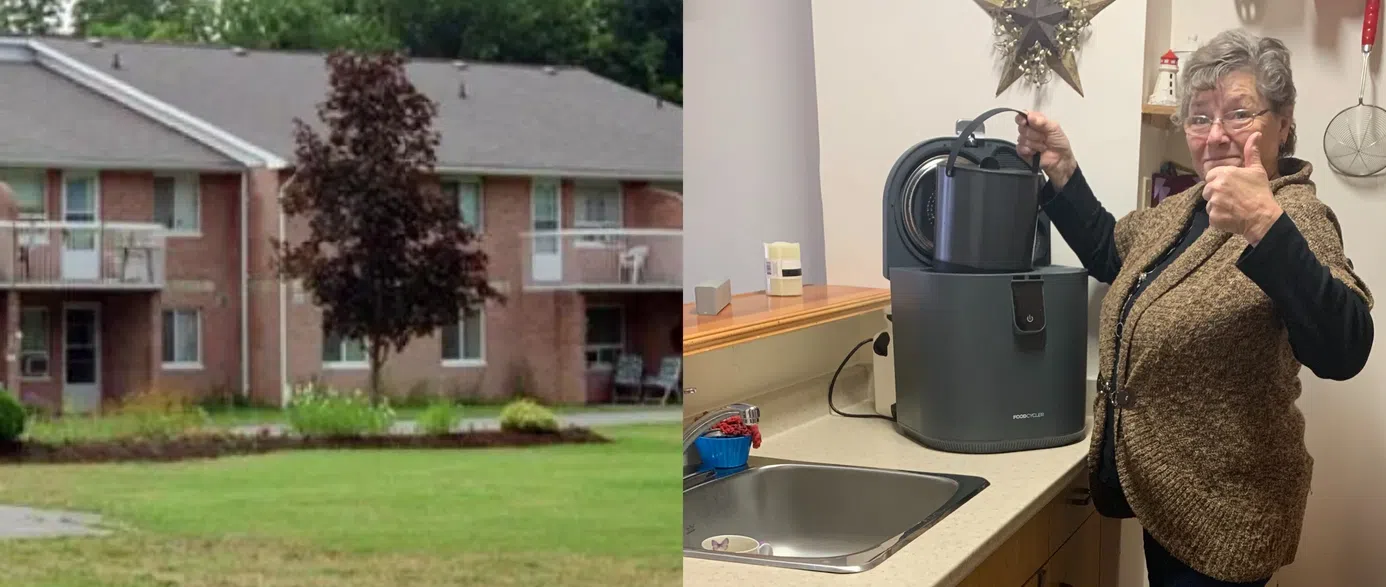A first-of-its kind pilot program encouraging food waste diversion in apartment buildings proved very successful in Belleville.
Food Cycle Science’s Municipal Division has been partnering with municipalities since 2020, deploying FoodCyclers in single family homes and has been working with some local municipalities.
The FoodCycler is a counter-top kitchen unit that converts organics into soil.
But the company is now looking at how their technology can work in multi-residential settings which may not have regular curbside organic collection.
Belleville’s Green Task Force approved the 12-week pilot project, funding the purchase of 13 of the devices for a Thurlow Housing building.
Food Cycle Science Municipal Solutions Manager Jacob Hanlon says the pilot ran from January to April of this year, with residents tracking their weekly usage of the FoodCycler.
“With these 13 residents in their apartments using the FoodCyclers they will divert about 6.8 metric tonnes, equivalent of C02 emissions per year. About 4.5 metric tonnes of food waste per year will be diverted from those 13 units.”
Hanlon says those results and feedback are consistent with what they’ve received from thousands of single households over the last four years.
“One of them mentioned that they only have half a bag of garbage to take to the bin now when they do take it to the garbage room. And, I think that we can all agree that in the apartment and condo space with garbage rooms and garbage chutes it can be quite challenging to deal with food waste.”
Another resident said they had to give up composting when they moved from a house to an apartment and appreciated this opportunity and one said while their building does have a big composter outside, they had trouble accessing it using their walker and this presented a great alternative.
“I think it really adds an emphasis to how much food waste is actually in our garbage which we aren’t always aware of when we’re just putting it in a bin or in a bag and it’s out of sight, out of mind. When we’re actually managing it on a daily basis, we see that there is quite a bit of food waste and quite a bit of it can be avoidable food waste.”
Hanlon says what to do with the byproduct in an apartment setting was something they had to figure out.
The building in the pilot does have a backyard-style compost bin and community gardens onsite where the waste can be disposed of but that’s not the case everywhere.
“The main best practice moving forward, especially when you get into larger buildings, buildings that don’t have a composter or community gardens onsite, is just having a, kind of a green cart-style bin whether it’s in a garbage room or a parking garage.”
Hanlon notes the byproduct is reduced by about 90 per cent from what it was, so the collection would be periodic either by the municipality or a private hauler and therefore would not likely represent a large cost increase to garbage collection especially since other waste would be dramatically reduced.
Food Cycle Science recently presented the results of the pilot program to Belleville’s Green Task Force and Hanlon says they are now working with city staff to put together a report and recommendations to bring to council in the near future.
“In our eyes we would love to see this program expanded further into more buildings within the city. Based on this pilot it’s been very successful on the environmental and waste reduction side of things.”
It’s hoped other municipalities will be interested in bringing the program to apartments and condominiums on the strength of the Belleville pilot.
Learn more about Food Cycle Science’s multi-residential pilot program in Belleville here.






